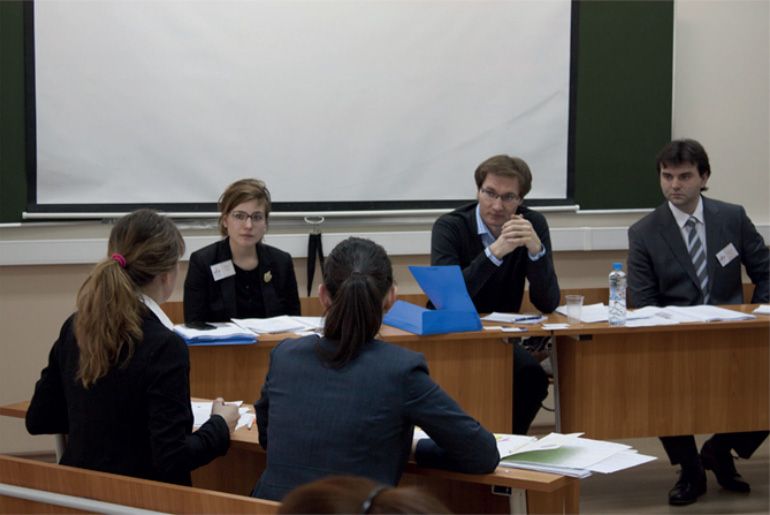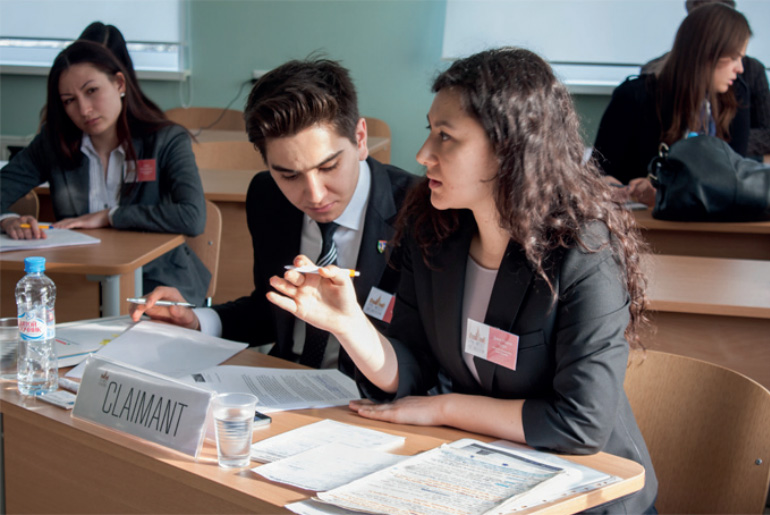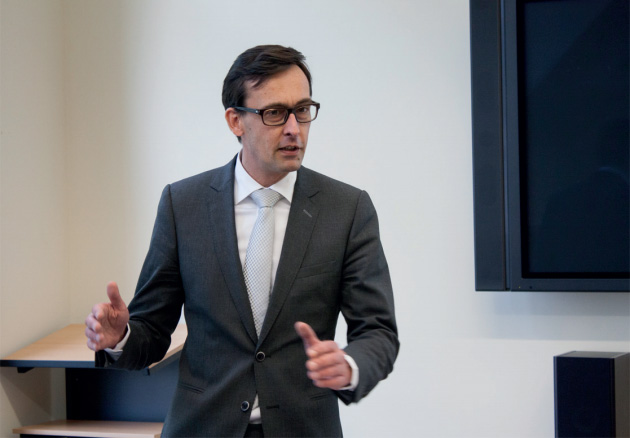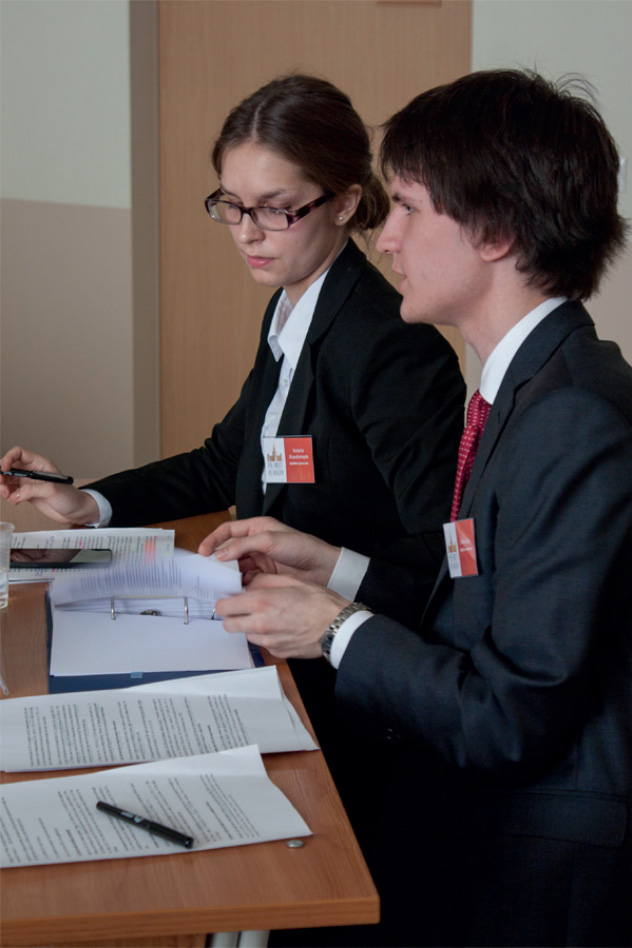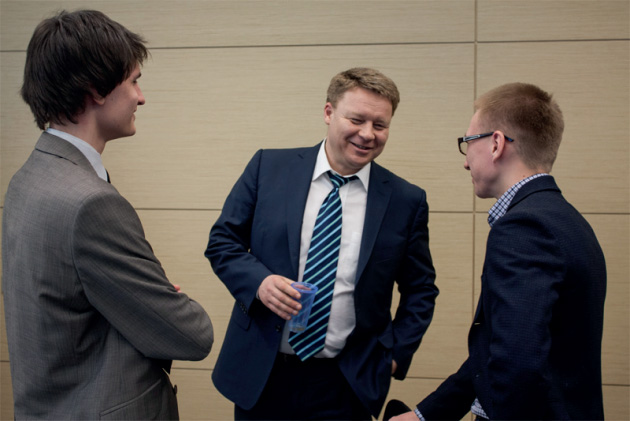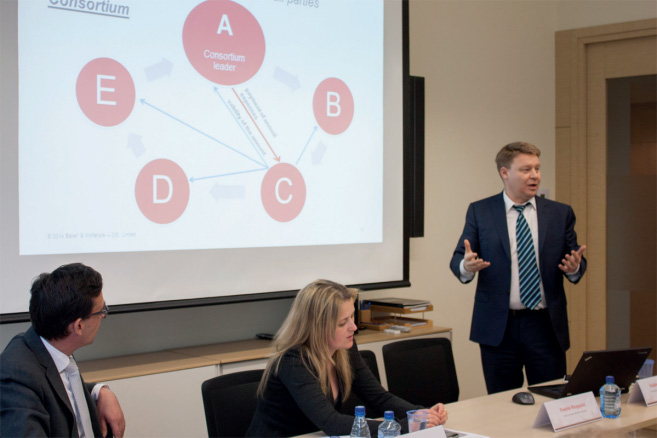5th Moscow Pre-Moot
On 22-23 March 2014 the Faculty of Law of Lomonosov Moscow State University hosted the 5th Moscow Pre-Moot to the world’s leading moot competition in private law and arbitration – the Willem C. Vis Internatonal Commercial Arbitration Moot. Since inception in 2010 the Moscow Pre-moot has grown from a small event, with only a few Russian teams participating, to a well-known forum bringing together hundreds of participants coming both from Russia and abroad where student-participants meet experts in international arbitration and hone their skills before the main competition in Vienna.
The Moscow Pre-Moot consisted of a set of mock arbitration hearings, in which teams of students represented parties to an international sale of goods dispute before panels of experienced arbitration practitioners and scholars. This year the proceedings were governed by the CEPANI Rules and issues in dispute between the parties concerned, inter alia, applicability of the CISG, consolidation of claims and pathological arbitration clauses.
Nine Russian and foreign teams (both regular participants and newcomers) took part in the 5th Moscow Pre-moot: Ankara University, Belarusian State University, Lomonosov Moscow State University, MGIMO University, Moscow State Academy of Law, National Research University Higher School of Economics, Peoples’ Friendship University of Russia, Russian Academy of Justice and South Texas College of Law.
Experts from the Higher Arbitrazh Court of the Russian Federation, Lomonosov Moscow State University, the Russian School of Private Law, the Ministry of Justice of the Russian Federation, partners and lawyers from law firms Alrud, Baker Botts, Baker & McKenzie, BBH, Cleary, Gottlieb, Steen & Hamilton, Clifford Chance, Egorov Puginsky Afanasiev & Partners, Freshfields, Herbert Smith LLP, Ivanyan and Partners, Linklaters, Mannheimer Swartling, Monastyrsky, Zyuba, Stepanov & Partners, Morgan Lewis, Norton Rose, White & Case and in-house counsel from Rosneft, UBS, Yandex and MDM-bank acted as arbitrators.
During 22nd and 23rd of March each team pleaded at least 4 times for both Claimant and Respondent. Based on the average scores received by individual participants, the team of South Texas College of Law won the Pre-moot. Team of Lomonosov Moscow State University finished 2nd, and team of Russian Academy of Justice – 3rd. The prizes were also awarded to the top three students for individual performance: 1st – Alvin Joel Santos (South Texas College of Law), 2nd – Yana Kovnatskaya (Lomonosov Moscow State University), 3rd – Polina Lomakina (Higher School of Economics).
The event would not be possible without the sponsor’s support. The Pre-moot organizers take this opportunity to thank White & Case (and personally David Goldberg, Jula Zagonek, Olga Pryanichnikova and Daria Shevchenko), Cleary, Gottlieb, Steen & Hamilton (and personally Scott Senecal, Julia Solomachina and Yuri Babichev), Monastyrsky, Zyuba, Stepanov & Partners (and personally Yuri Monastyrsky), Morgan Lewis (and personally Jonathan Hines and Dmitry Ivanov) and Baker & Mckenzie (and personally Vladimir Khvalei) for their financial support and overall contribution.
RAA40 and Lomonosov Moscow State University are also grateful to the Pre-moot’s media partner – the Russian Law Journal (www.russianlawjournal.org).
Complex Arbitrations: Consolidation of Claims and Related Issues
On 21 March 2014 RAA40 and the Faculty of Law of Lomonosov Moscow State University co-organized the annual discussion preceding the 5th Moscow Pre-moot to Willem C. Vis International Commercial Arbitration Moot addressing one of the 21st Vis Moot topics “Complex Arbitrations: Consolidation of Claims and Related Issues”.
Julia Zagonek (Partner, White & Case) introduced the topic. She outlined the effects multi-party and multicontract transactions may have on arbitration. Julia focused on the issues specific to multi-party and multicontract disputes such as extension of arbitration agreement to non-signatories and parallel proceedings.
Julia explained that as early as at the drafting stage the parties to complex transactions should consider which procedural rules to choose as the approach to complex disputes may vary between jurisdictions and institutional rules. In particular, not every set of arbitral rules permits the tribunal to consolidate proceedings. She also emphasized that consolidation is not always the best way forward, since the parties can face such problems as finding arbitrators having the relevant expertise and acceptable to everyone, delays, cost increase and cost allocation, as well as the issues of privilege and confidentiality.
Vladimir Khvalei (Vice-President, ICC International Court of Arbitration; Partner, Baker & McKenzie) then addressed the issue of “multi” arbitration proceedings under the ICC Rules.
Vladimir reported that according to the ICC statistics from 2001 till 2009 more than two parties participated in at least 28.5 % of cases. He explained that an additional party could be joined in an ICC arbitration proceedings only if: (I) there is a request by one of the “existing parties” to the proceedings, (II) an additional party signed the arbitration agreement, (III) a claim is made against the additional party, and (IV) arbitrators have not yet been confirmed by claim is made against the additional party, and (V) arbitrators have not yet been confirmed by the ICC Court (the parties may agree to waive the latter condition).
After a short break Prof. Dirk De Meulemeester (Managing Partner, Lexlitis law firm) took the floor to address consolidation in arbitration. He began with an overview of the arbitral institutions’ rules and explained that while some of them vest on the tribunal wider discretion to order consolidation (e.g. ICC Rules 2012, CEPANI Rules 2013), others are silent on the matter (e.g. LCIA Rules, SIAC Rules).
He noted that consolidation has both advantages and disadvantages. On the one hand, it can be efficient as it allows to reduce legal resources, time and financial expenditures as well as to avoid conflicting awards. On the other hand, first, it can be difficult to enable all parties to participate in the nomination of an arbitrator and to distribute the costs fairly, and secondly, consolidation potentially may result in a violation of the party’s substantive rights, for example in cases where competitors are joined in one consolidated arbitration.
Finally, Prof. De Meulemeester explained that consolidation is feasible if disputes arise in connection with the same legal relationship, if they concern the same economic situation and if the arbitral agreements are compatible.
The discussion was closed with the presentation by Fredrik Ringquist (Senior Associate, Mannheimer Swartling) who discussed do’s and don’ts of drafting complex arbitration clauses.
